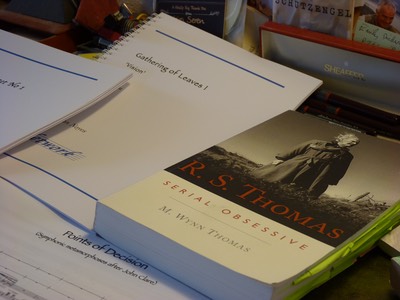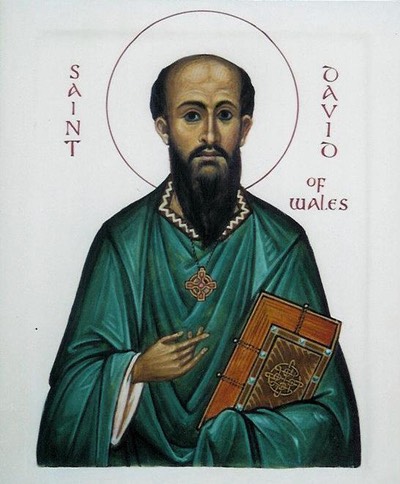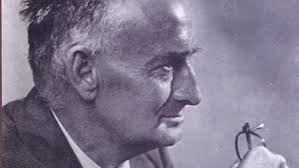St David’s Motets
Living near to St David’s in Pembrokeshire, with it’s beautiful cathedral, I thought that I might try writing some choral pieces, in the hope that the choir in the cathedral might perform them, so I looked into the work of St David and found some texts which I have some sympathy with, and which are quite famous and indicate his style of ecclesiastical thinking. They come from his last sermon, and could be used liturgically, I think, as they are of a suitable length for a service.
I separated the last sentence from the first, as I thought that they provided different moods which required space between them. The first motet starts jubilantly with ‘Be joyful’ and lasts about six minutes, while the second text – ‘I shall walk the path’ – is obviously more leisurely and reflective. This last about three minutes.
The first is a sort of ABA form but aspects of the ‘be joyful’ text appears throughout, giving the piece an overall jovial mood. It uses a particular fingerprint of mine, I think, which is hemiola. This gives the exhortation a certain informal, rough, but forceful rendition, which I like. The second motet is also loosely a ternary form, but is based upon the use of a bar of 4/4 but divided into 3+1 in the first limb, and 1+3 in the concluding A section, thus producing a sort of palindrome effect within the music, as a hidden structure. However, in both sections, the 3-beat parts of the bar are themselves divided into two dotted crotchets, in order to give a sort of leisurely walking effect to the music. Both pieces are loosely tonal in harmonic style, and mostly scalic.
Gathering of Leaves I – Vision
This piece stems from a desire to celebrate the work of the pacifist Welsh poet Waldo Williams, and is my experiment in integrating certain aspects of tonality into my language. A previous orchestral piece of mine (Shadows of Memory) worked with rhythm and structural pacing, principally, so I cherished the challenge of composing lyrically for a change. I felt a strong connection with Williams’ poem Ty Ddewi, because of its humanitarian ideals. In it he describes an epiphanal moment at the summit of Carn Llidi mountain, near St David’s, Pembrokeshire, where he saw the countryside before him as the home of community, the inherent goodness of people and their labour, and all nurtured by the tradition of Welsh poetry that coursed “like rivers” through the land.
I wondered, too, why modernism has a tendency to the sombre, so decided consciously to find a lyrical voice to metaphorically portray the joy of Waldo Williams’ epiphany in mankind. And furthermore, I quixotically questioned if a C major chord could be incorporated into a contemporary classical language, with sincerity and integrity, to viscerally communicate joy, without resorting to pastiche. Thus, I gathered together the various ideas which had blown into my view, the ideas of lyricism, tonal chords, portraying joyous emotions in music, and Williams’ poem and its attendant episodes, even though it includes a passage about the torture of war, and tried to assimilate them into this piece.
Waldo Williams’ ethics stem from the image of the ‘Tree of Knowledge’, where rootedness of community, goodwill, strength of spirit, etc., provide him with an empirical, positive, and humanistic ideal. His poetry collection ‘Dail Pren’ (Leaves of a Tree) issues from this precept, giving artistic voice to the myriad facets of our spiritual and communal lives. My title (Gathering of Leaves I) gathers these images, like scattered leaves, as I attempt to commemorate this poet’s ideas, in this first piece of a set, and bind them artistically into a volume of musical works. Serendipitously, a ‘gathering’ is a bibliographical term denoting a small collection of folded pages, several of which are stitched together to form a complete book.
Gathering of Leaves II – Lament for Princess Gwenllian
When I came across the story of Princess Gwenllian I was immediately struck by the tragedy of her life, and of how the external world of conflict and conquest had forced itself upon her innocence. Her story is not well known, either, and that fact contributed to the idea of writing a composition about her, as I felt that it should be more well known, at least to Welsh people. There is so much of Welsh history that is subsumed in the British history books, and tossed aside in favour of the English perspective.
Gwenllian was the young baby daughter of Llewellyn ap Gruffudd, the last ruling Prince of Wales. She was born in June 1282, and her father was killed by forces of Edward I in December of the same year. This led to the complete conquest of Wales by Edward I, and to prevent any uprising from supporters of the royal line of Welsh princes Edward had baby princess Gwenllian sent to the priory at Sempringham, in Lincolnshire, where she was held for the rest of her life, thus being prevented from marrying and bearing children who may have resurrected claims to the royal lines of Gwynedd and independent Wales. The innocent little child was thus caught up in momentous upheavals of state, and forced into a life of piety, without knowing her parents, or being able to speak her native language. She died in 1337, aged 54 years
It was her wasted life, and compulsory incarceration, that seemed so tragic, to me. Furthermore, when I visited the web site of the Princess Gwenllian Society I found two poems, written by famous contemporary Welsh Poets T James jones, and Mererid Hopwood, who have both been winners of the Chair at National Eisteddfods. These were powerful poems that emotively expressed both the personal tragedy to Gwenllian, and the national tragedy to Wales. Such emotive qualities I wanted to capture in this piece of music, so it proceeds as a series of Processionals interspersed by vocal Laments from the three sopranos, amplified to bring greater presence to the overall soundscape. The music progresses towards a climactic point, about half way through, which is an extremely forceful orchestral tutti (it can be thought of as a slamming door), which in itself echoes through the rest of the composition, while the sopranos sing words taken from the poems, and others that I have felt necessary to the expressive nature of the moment. I did not want to ‘set’ a particular text, as I felt that that approach would define the piece too much, and limit its expressive nature, so instead words are used isolated from grammar and syntax just for the quality of their meaning, thus letting the music have more depth.
The solo violin acts as a commentary to the music, and particularly to the music of the sopranos, as if concentrating the expressivity into a solitary voice, unhindered by text. Additionally, a three-note falling figure seemed to develop as I was writing the music, in both the Processionals and Laments, which took on the role of a distant echo of Gwenllian’s name, reminding us of her gentle nature, and innocence. Another idea also grew during the process of composition: a note-centre of d”, extolled on the tubular bell, and which initiates a repeating phrase, by the sopranos, from the poem by T James Jones, “Ein hangof” ( we forgot). The complete last verse of this poem is heard at the end since it reflects the positive idea that in remembrance of Gwenllian the nation can claim her back as an important figure in Welsh cultural identity. After all, to quote the poem by Mererid Hopwood, “she is the poem and the notes of the song”.
As the title shows this is the second in a series of pieces concerning Wales and Welsh culture, called ‘Gathering of Leaves’, which takes its title from the book of poetry published by the mid twentieth century Pembrokeshire poet Waldo Williams – ‘Dail Pren’ (Leaves of a Tree). I had felt that I was in the process of creating compositions which defined an artistic outlook, gathering them together, sweeping up the leaves of a tree (the ‘Tree of Knowledge was important to Waldo Williams), or gathering the pages of my own book in much the same way that the leaves of a book are gathered together when bound. As I was working on the first of these pieces I found out, incidentally, that the separate bunches of pages that are stitched together are called ‘gatherings’ by binders in the bibliographical trade, which I thought fitted well the idea that an ‘oeuvre’ of artistic works is built up to portray a personal outlook.



